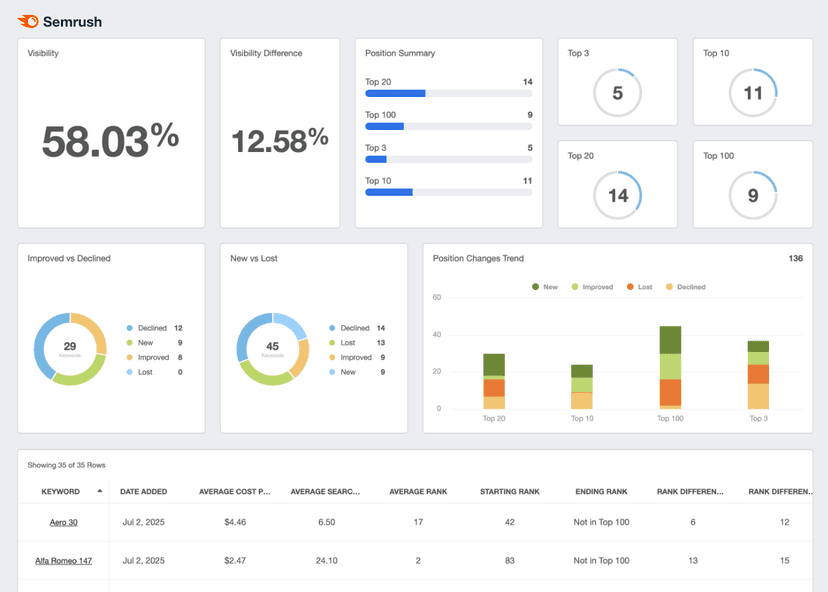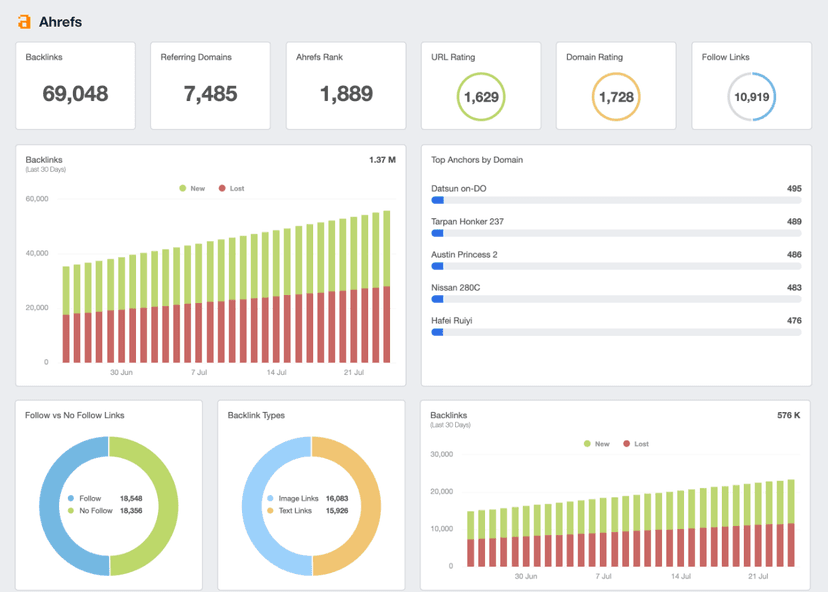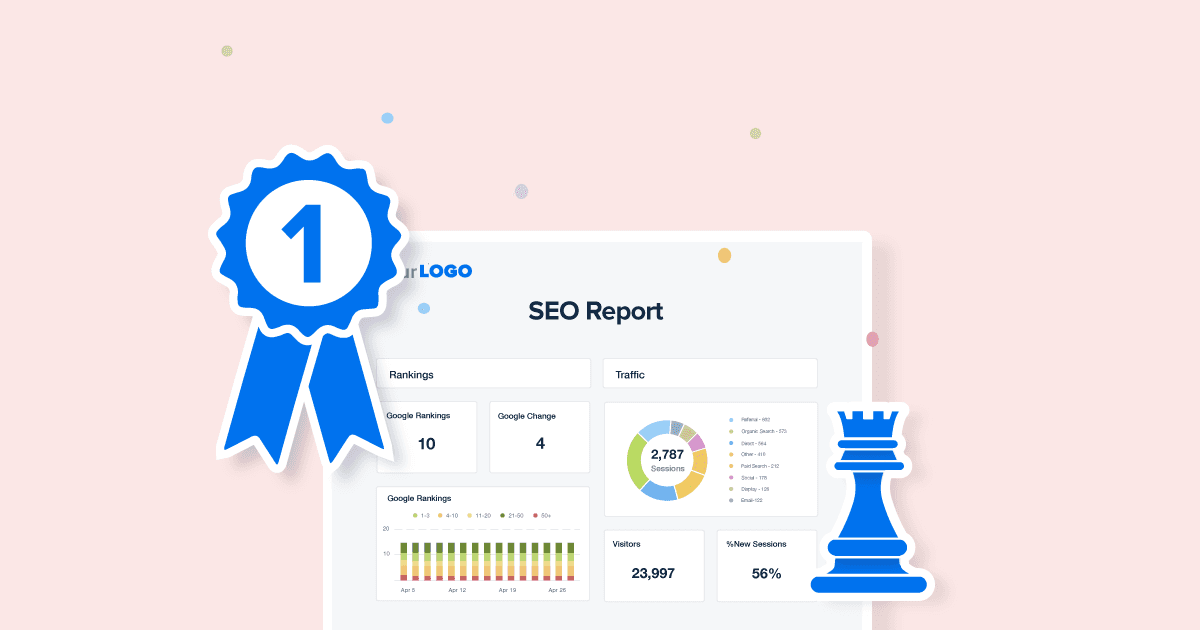Domain Authority (DA)
Link Opportunities
Use Domain Authority to pinpoint high-value backlink targets.
Analyzing Competitors
Assess competitor site strength for SEO strategies and keyword selection.
Client Reports
Feature increases in Domain Authority in reports to emphasize the value generated by SEO campaigns.
Gap Analysis
Identify weaknesses to refine the overall SEO approach and content plan.
What Is Domain Authority and Why Does It Matter?
Domain Authority is a ranking score developed by Moz, although similar versions are now available in Semrush, Ahrefs, and other SEO tools. It’s calculated using multiple factors, including site architecture, social signals, linking root domains, and the total number and quality of inbound links.
Beyond being a mere number, it is a comparative tool that helps evaluate one website against another. Often used in various SEO and online marketing tasks, it influences SEO strategies, including link-building and content optimization.
While Domain Authority may correlate with good SEO practices that Google appreciates, it in itself is not a Google ranking factor. Google has its own complex algorithms composed of hundreds of unique elements it uses to determine where a site lands on search engine result pages. DA may guide and predict future rankings but does not directly influence them.
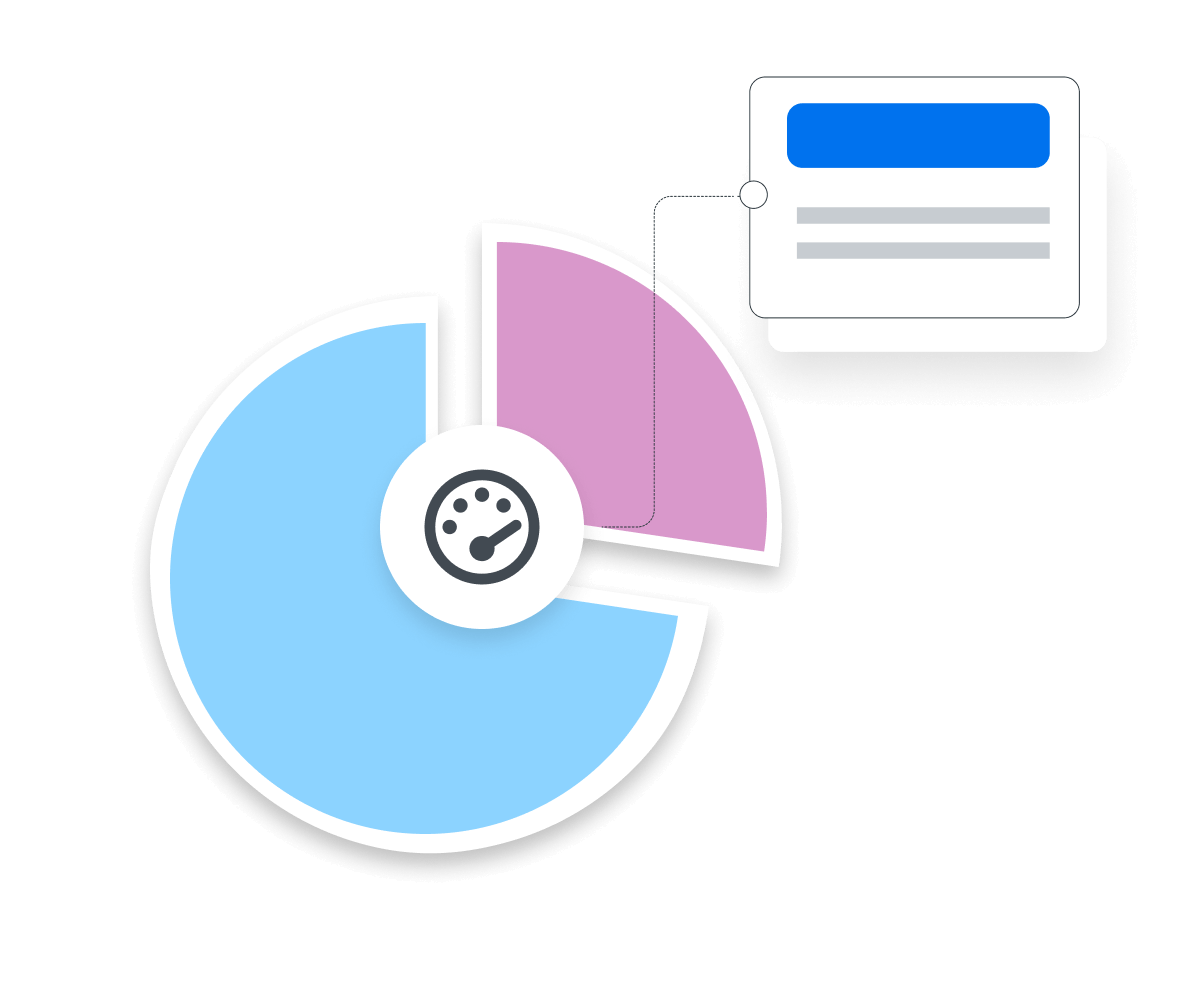
Stop Wasting Time on Manual Reports... Get SEO Insights Faster With AgencyAnalytics
The Symbiotic Relationship with Other KPIs
Domain Authority is intrinsically linked with other key performance indicators such as Page Authority, Keyword Ranking, Organic Traffic, and Backlinks. For instance, a rise in high-quality backlinks from diverse referring domains often corresponds with an improvement in Domain Authority scores. Likewise, a domain with a high Domain Authority is more likely to achieve favorable keyword rankings in Google search results.
Similarly, Page Authority, a metric that evaluates the strength of individual pages, often moves in tandem with Domain Authority. After all, a site composed of authoritative pages is likely a website with robust Domain Authority.
Although not always a direct correlation, search engines prioritize domains with more authoritative content, directly impacting metrics like organic traffic. It’s also important to remember that Domain Authority is a means to an end, not the goal. The reason for tracking and optimizing DA is to drive increased rankings, traffic, and revenue, so it’s always essential to put the metric in the context of these results.
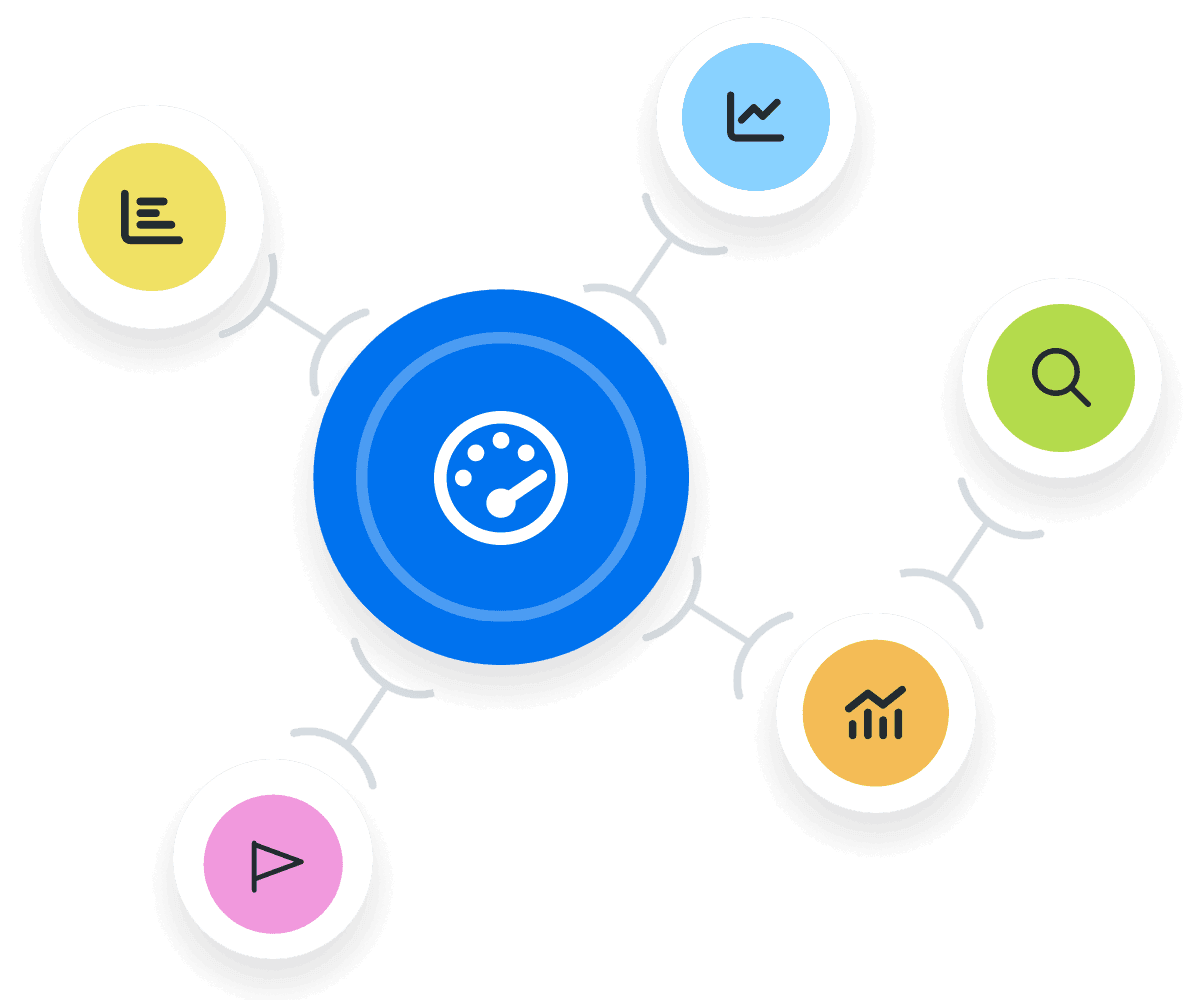
A client may say they want their Domain Authority strengthened, but what they really want is higher rankings for the right keywords that bring them new customers. It is possible to increase Domain Authority with spammy link building, but that wouldn’t give the client what they really wanted.
How To Track Domain Authority
Tracking a website's Domain Authority requires SEO tools like Moz, Ahrefs, or Semrush.
Moz is often the go-to option as the originator of the Domain Authority metric. It offers a proprietary algorithm, Moz Domain Authority, which provides a single DA score that predicts how well a website will rank in search engines.
Ahrefs and Semrush offer similar but uniquely branded authority metrics: Ahrefs Domain Rating and Semrush Authority Score. While not the same as Moz's DA score, these metrics serve similar functions and are calculated using factors like backlinks and referring domains.
Regardless of the tool, regularly tracking this authority metric helps gauge a website's standing and informs future SEO strategies.
What Is a Good Domain Authority Score?
Good Domain Authority scores range from 40-70, based on the Moz and Semrush scoring algorithms. Ahrefs Domain Rating tends to score higher, so this range moves to 60-80. These numbers are not set in stone but offer a general guideline.
What Is a Bad Domain Authority Score?
DA scores below 15-20 on Moz generally indicate room for improvement. A low score adversely affects search engine rankings, meaning the website's content and backlink profile may need bolstering.
How To Set Domain Authority Benchmarks and Goals
Instead of relying solely on generic benchmarks, agencies often use historical data or competitive research to set customized benchmarks. Looking at past DA scores shows a trend over time, while analyzing competitor scores offers industry-specific context. Both approaches help agencies tailor their goals and expectations more accurately.
For a more detailed understanding, examine the backlink profile contributing to the DA score. Analyze the quality of linking domains and the distribution of those links across web pages. Watch the DA trend over time in relation to specific campaigns to identify what moves the needle.
Median Moz Domain Authority for SMB Campaigns
The median Moz Domain Authority currently sits at 19, based on performance benchmarks from over {{campaign-count}} campaigns managed by {{customer-count}}+ marketing agencies. This figure reflects the typical range for SMBs, which often have lower domain authority compared to larger or more established websites.
Understanding how a Domain Authority score compares to industry standards helps agencies evaluate the strength of a website’s backlink profile and uncover opportunities to build high-quality links that drive organic growth.
Access detailed performance benchmarks and see how campaigns measure up. Get started with a 14-day free trial.
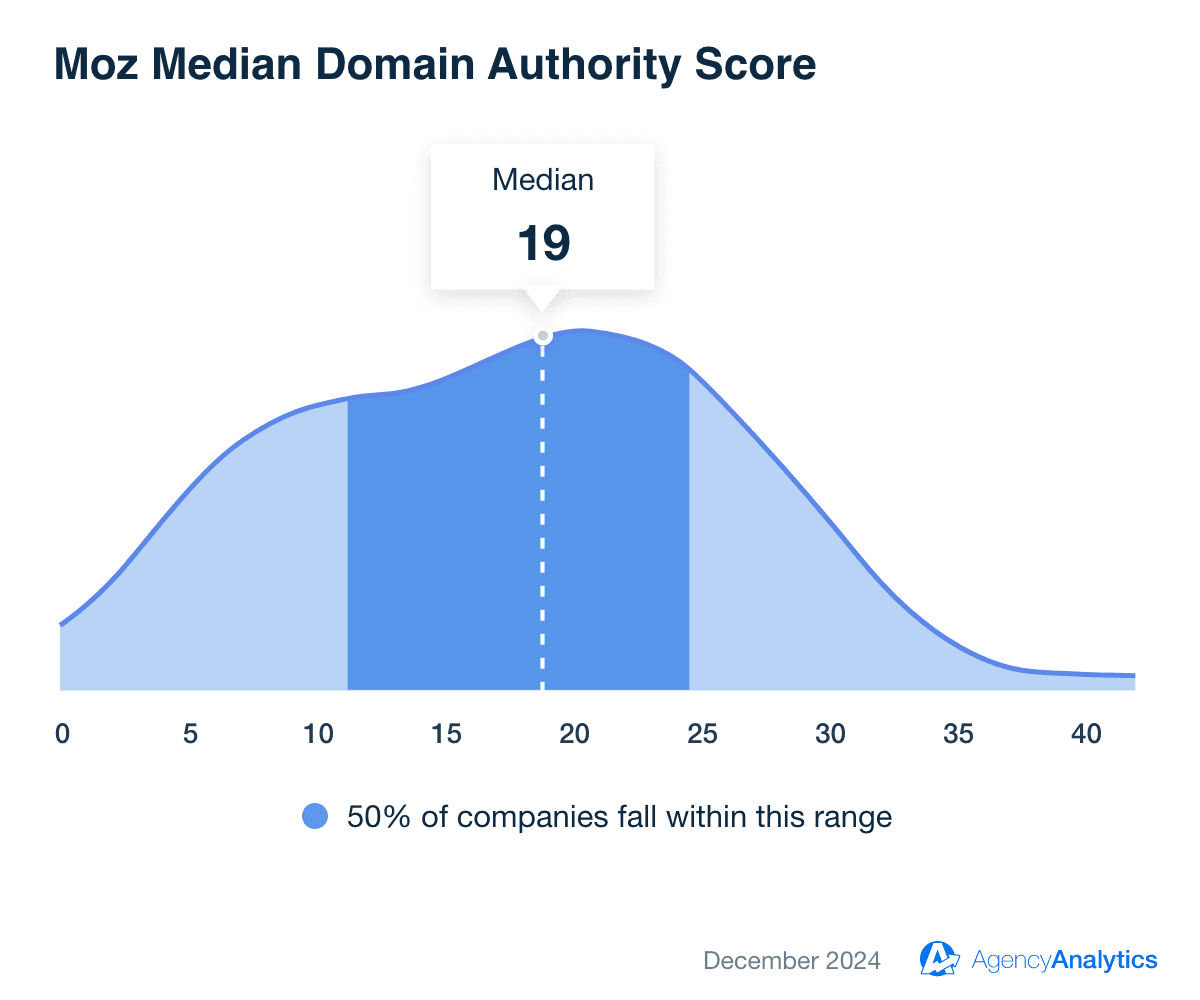
Why Domain Authority Matters to Clients
From a client's perspective, a high Domain Authority score signals strong website authority and translates to more search traffic. The metric also provides a bird's-eye view of how effective link-building strategies are in acquiring relevant backlinks.
A high Domain Authority also offers a competitive advantage, so clients often use it as a comparative metric to see how their website stacks up against competitors. Maintaining a higher DA than others in their industry provides a competitive edge that clients will appreciate.

Why Domain Authority Matters to Agencies
Domain Authority is a valuable tool for client satisfaction and long-term engagement for agencies. A favorable Domain Authority score proves the agency's link-building strategies and SEO efforts are moving a critical needle. Agencies showcase these scores to underscore their impact and retain clients.
Domain Authority also helps agencies fine-tune their SEO tactics. By identifying authoritative domains to target for backlinks and using the score as a comparative metric, agencies more effectively allocate resources.

Save Time and Money by Automating Your Client Reporting
Best Practices When Analyzing and Reporting on Domain Authority Scores
Evaluating Domain Authority from multiple angles lays the foundation for a more thoughtful SEO strategy. When discussing Domain Authority with clients, clarity and context are key. Here are some best practices that elevate an agency's reporting game from informative to invaluable.
Trend Tracking
Monitoring Domain Authority and SEO performance over a set period uncovers the effectiveness of SEO initiatives. Noticeable improvements mean the strategies are paying off.
Client-to-Client Comparison
SEO teams refine best practices by comparing Domain Authority between various clients. What works for one might be the secret sauce for another.
Decoding DA Fluctuations
Sharp increases or declines in Domain Authority warrant investigation. DA typically moves slowly, so sudden shifts often hint at the need for strategy adjustments or reveal potential issues.
Contextualize Domain Authority
Domain Authority measures the relative strength of a site, but because DA is a predictive score, correlating it with metrics like keyword rankings and organic traffic reveals its real-world impact.
Visualize DA Performance
Charts and graphs make high Domain Authority scores sing. These visuals help clients easily correlate strong DA scores with other markers of digital performance, such as link-building success, search engine rankings, and traffic increases.
Aligning DA With Client Goals
To resonate with clients, Domain Authority reporting should be tailored to their unique goals. Whether the aim is building a brand reputation or improving organic search traffic, demonstrate how DA plays into these objectives.
Moz Dashboard Example
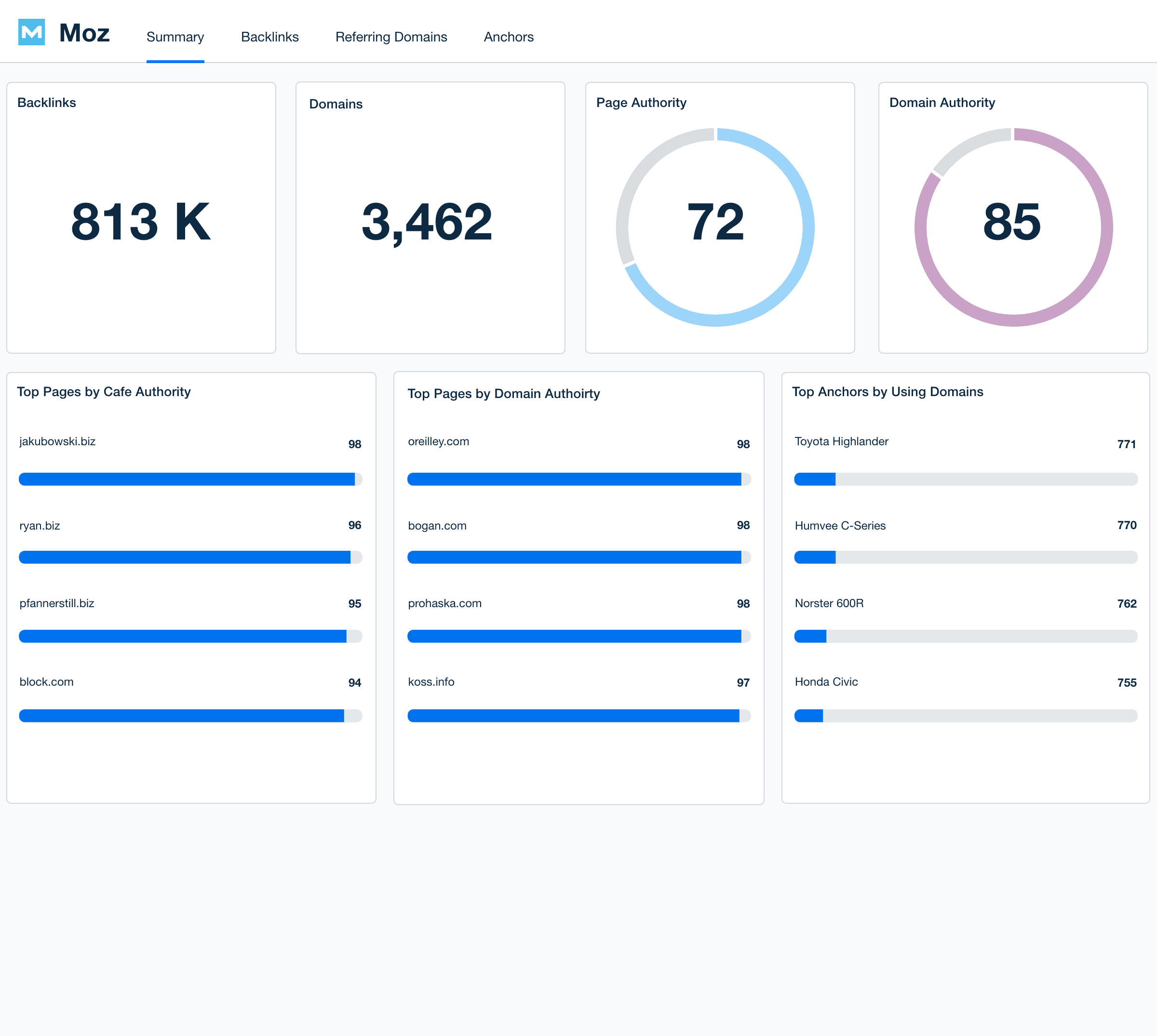
Related Integrations
How To Improve Domain Authority Scores
Improving Domain Authority scores is not an overnight task, but a few strategic efforts go a long way. Here are three actionable tips to make a meaningful impact.
Gain Quality Backlinks
More backlinks from authority sites help boost Domain Authority. Prioritize outreach to high-authority websites in the same industry, and offer valuable content worth linking to.
Amplify Social Signals
Active social media engagement positively influences Domain Authority. Consistently share quality content and interact with the audience to increase social signals.
Enhance User Experience
Improving site usability and engagement doesn't just please visitors; it also impacts Domain Authority. Simple navigation and fast load times encourage longer site visits and lower bounce rates.
Related Blog Posts
See how 7,000+ marketing agencies help clients win
Free 14-day trial. No credit card required.


